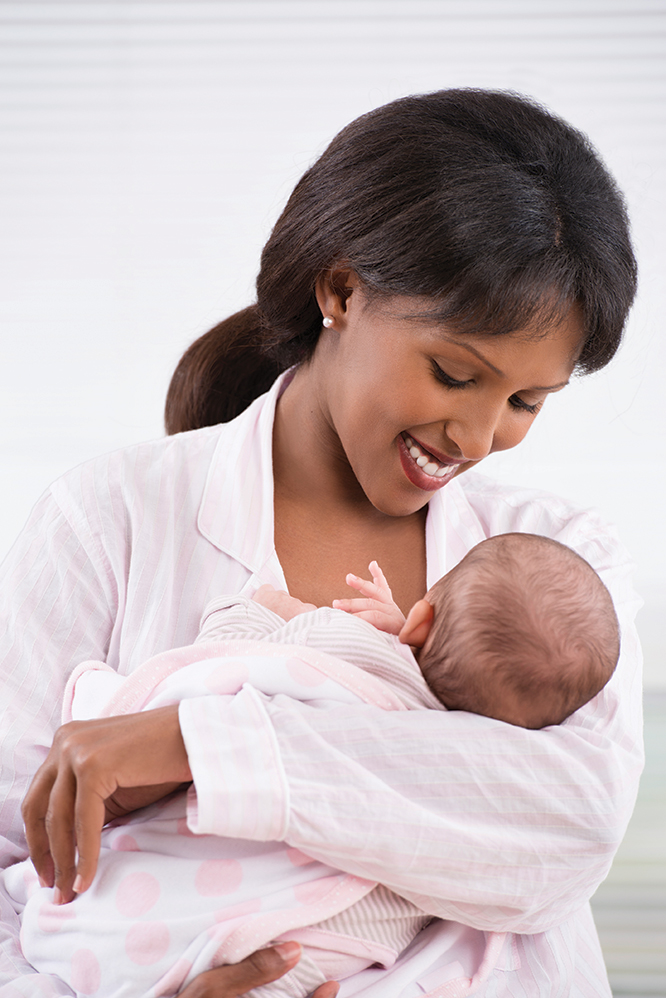
You’ve anticipated baby’s arrival for nine months, poring over parenting articles and tracking his or her development in the womb. After a dramatic entrance, your baby is here!
Your little bundle is eating, crying or pooping every two hours, and you can’t see straight. You don’t have time to read all those parenting books you bought with the best intentions! That’s why we created this quick and easy guide to baby’s first year. You can read it in between posting photos on Facebook and Tweeting about every little thing your beautiful baby does.
Read on to learn about your baby’s physical and cognitive developments, social milestones and what to watch out for during the first six months. Remember: Every baby develops differently, and there is a wide range of “normal.” If you have concerns, always ask your doctor. Oh, and congratulations!
All about your 1-month-old baby!
Physical development: Baby’s hearing is fully developed (for newborns, a hearing screening is done on all babies born in a hospital in Washington state) and he might have a startle response toward familiar sounds — your voice or a loud noise — says Dr. Michelle Terry, an attending physician at Seattle Children’s Hospital. At this early stage, his head and neck need careful support.
Brain development: Your baby can’t focus farther than 8–12 inches away — just the right distance for him to gaze at your face when he is being held in the crook of your arm. Black-and-white patterns also draw his attention, says Terry.
Social development: Enjoy getting to know your baby. Cuddle him, talk to him and learn how he signals when he’s sleepy. Give him plenty of tummy time while he’s awake, but always put him on his back to sleep, says Terry.
Fun fact or milestone: Babies are born wired to learn and they do it best by imitating. In studies on imitative learning conducted by Andrew Meltzoff, Ph.D. (of the University of Washington’s Institute for Learning and Brain Sciences, or I-LABS), a baby who was 42 minutes old mimicked the doctor’s facial movements, says Princess Ivana Maria Pignatelli Aragona Cortes, a real-life princess, mom of two and co-author of the book A Simple Guide to Pregnancy & Baby’s First Year.
What to watch for/common concerns: Each child develops at his own pace, but Terry advises that you talk to your baby’s doctor if your 1-month-old feeds slowly or doesn’t suck well; has problems peeing or pooping; doesn’t seem to focus his eyes or watch things moving nearby; doesn’t react to bright lights; seems especially stiff or floppy; or doesn’t respond to loud sounds.
One important thing you can do for your baby: Encourage him to look at and reach for toys. Make sure he gets plenty of time outside. Go for walks with him. Read to him every day. Baby books are made sturdy because they will be put into mouths and dropped a lot, says Terry.
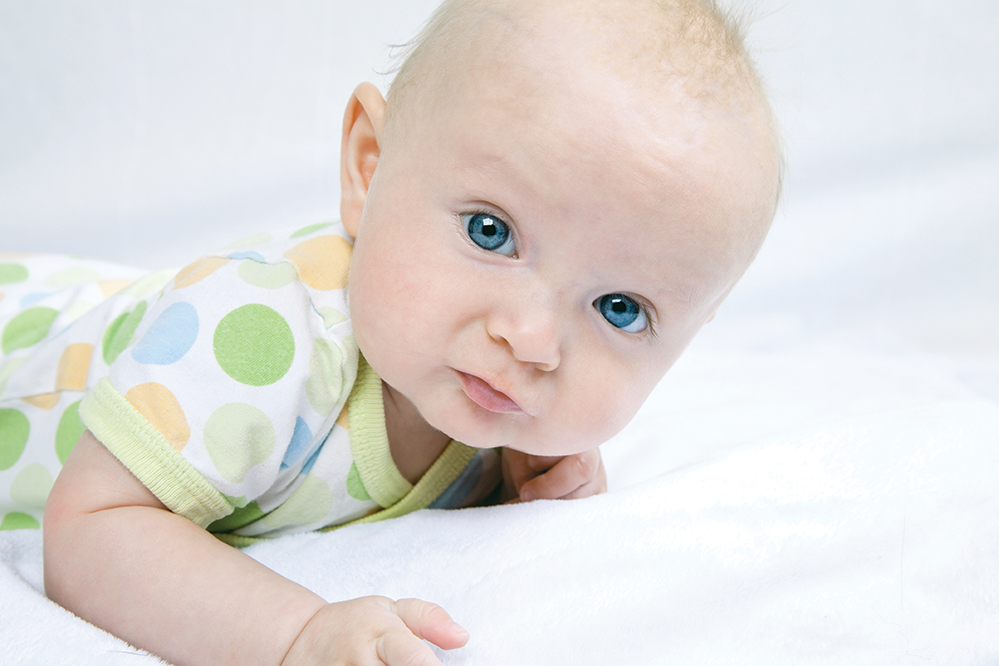
All about your 2-month-old baby!
Physical development: Baby can lift her head briefly and turn it to the side when she’s on her stomach, but when she’s upright, her head and neck still need support. Although her arms move jerkily, she can get her hands close to her mouth, says Terry.
Brain development: At birth, your baby’s brain is at 25 percent of its adult size. At 12 months, your baby’s brain will have grown to 70 percent of its adult size. Baby’s first year marks the most rapid brain growth of her lifetime, says Princess Ivana.
During that time, the developing brain (including learning and language abilities) is directly affected by baby’s interaction with the world around her. That’s why your baby is busy soaking in sounds, sights, tactile sensations, smells, language and emotional surroundings as well. Object recognition and hand-eye coordination are your baby’s major developmental tasks at this age.
Social development: Babies are active communicators. An infant shows interest by turning her head toward an object or by gazing at it. If a baby needs a break, she will turn away. Cries are also a means of communication. They tend to have different sounds, depending upon the various cues, whether hungry, sleepy, gassy or lonely and in need of some attention, to name a few. (Want to learn more? See parentmap.com/whybabiescry.) Getting to know your baby’s voice is a process of trial and error. Be patient and do your best to respond to her cues. This will teach her both trust and confidence.
Fun fact or milestone: Babies will learn to reach toward you and may grasp objects tightly for a few seconds. They are working on their hand-eye coordination, so you may catch them studying their hands.
What to watch for/common concerns: Poor weight gain, lack of responsiveness to lights or noise or extreme floppiness may be warning signals of potentially serious health concerns. Early detection and treatment are key. Be sure to contact your doctor if your baby has any of these symptoms.
One important thing you can do for your baby: Baby should be drinking breast milk with vitamin D supplements or commercial formula, says Terry. Put her on her tummy daily so she can strengthen her muscles (and not develop a flat head). When she’s on her tummy, put toys out of her reach so she can try to get them. Talk and sing to her throughout the day, describing what you’re doing and naming familiar objects. Read books together.
All about your 3-month-old baby!
Physical development: Three months usually brings a growth spurt, so your baby may be hungrier. Let him eat as much as he wants, says Princess Ivana. A bonus for breastfeeding moms: Nursing burns calories, which can help you lose the baby weight more quickly. But be careful not to lose too much weight at once; feed yourself healthfully and frequently.
A bonus for breastfeeding moms: Nursing burns calories, which can help you lose the baby weight more quickly.
Brain development: Motor skills are getting stronger and with them, the brain’s architecture is growing as your baby interacts with the world. White matter, which affects the brain’s speedy processing, is growing rapidly, too, laying the foundation for creative thought.
At this age, your baby watches faces intently, follows moving objects, recognizes familiar objects and people at a distance, starts using hands and eyes in coordination, smiles at the sound of your voice, begins to babble, begins to imitate some sounds and turns his head toward the direction of sound, according to HealthyChildren, a website powered by the American Academy of Pediatrics.
Social development: This is the time for the laughter and coos that will warm the heart of everyone your baby comes in contact with. Your baby’s personality comes into play, and play is the way to help your baby grow, says Princess Ivana. When your baby coos, coo back. Modulate your voice and don’t be afraid of acting silly.
Fun fact or milestone: Baby’s tummy time, usually spent stretching and kicking, may turn into partial rolls from side to back. Be sure to give your baby regular, supervised tummy time, which is important for development. If baby gets frustrated, that’s absolutely normal. Don’t be afraid to let him squirm a little, but always be ready to comfort and give him a different activity when he needs it.
What to watch for/common concerns: Each child develops at his own pace, but talk to your child’s doctor if your 3- to 4-month-old can’t support his head well; can’t grasp objects; doesn’t smile; doesn’t react to loud sounds; or ignores new faces, says Terry.
One important thing you can do for your baby: Offer your baby toys to look at. Introduce them one at a time. Allow baby to explore and focus on each one. Use a variety of shapes, sizes and bright colors. Play tracking games by moving your face and toys back and forth. Good toys at this age include rattles, a soft doll or a picture book.
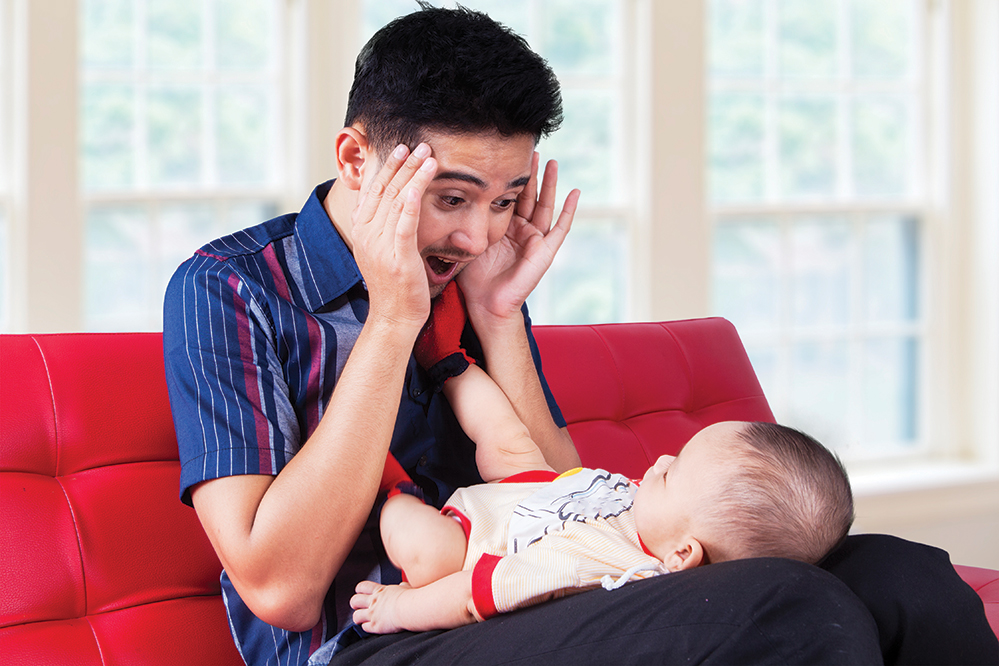
All about your 4-month-old baby!
Physical development: Baby is learning to roll over! Help her learn to sit independently and position her to play on both her stomach and her back.
Brain development: Your baby becomes more aware of her surroundings and wants to explore, says Princess Ivana. Her arms pump and her legs kick as if she’s swimming in air. Wiggles get stronger. As hand-eye coordination gets better, your baby will be able to grasp objects and find ways to taste the world — everything goes into her mouth. Be careful about what you leave within baby’s reach.
Social development: Your baby can laugh, has babbling “conversations” with you and she recognizes the sounds of different languages, so it is not confusing for her to learn multiple languages at the same time, says Terry.
Fun fact or milestone: Peekaboo is a favorite game, and she enjoys finding partially hidden objects. Watching herself in a mirror is sure to delight her, says Terry. She might become fascinated with other babies and older children.
What to watch for/common concerns: Terry says each child develops at her own pace, but talk to your child’s doctor if your baby seems very stiff or floppy; can’t hold her head steady; can’t sit on her own; doesn’t respond to noises or smiles; isn’t affectionate with those closest to her; or doesn’t reach for objects.
One important thing you can do for your baby: Work on establishing a routine for sleeping, feeding and playtime. Be flexible, but incorporate as much predictability for her as possible. Steps such as a warm bath at nighttime and a particular piece of music before feeding can become cues to help your baby learn what’s coming next and how to calm down.
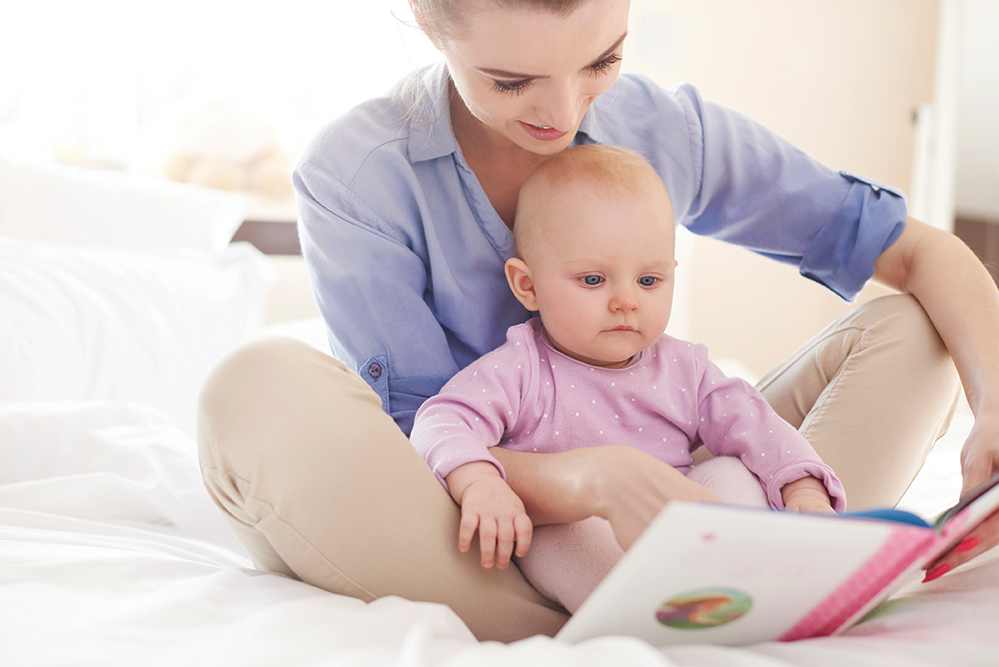
All about your 5-month-old baby!
Physical development: Your baby may give you a first hug, says Princess Ivana. Babies discover their body parts; tugging on their own ears is especially satisfying. Your baby may make his first attempts to sit up. He may get his first tooth. Baby will have better head control and raise his head well when lying down, according to the Mayo Clinic.
Brain development: Memory and attention span increase, which build stronger recognition skills. Babies begin to recognize words and try to repeat them through practicing various sounds, says Princess Ivana.
Social development: Your baby is getting pretty good at giving you clear signals about what he wants, using both his burgeoning verbal skills and body language, such as raising both hands when he wants to be picked up. Your baby is likely displaying a sense of humor, too. “No one likes to laugh alone,” Princess Ivana says, so play along and discover your own silly factor.
Fun fact or milestone: Babies like music and can recognize melodies they’ve heard while in the womb, says Princess Ivana. According to recent studies, babies who listen to music show better communication skills. Play music as a focused activity. Try a variety of styles; see which songs are your baby’s favorites. Often you will know by the way your baby bounces to the beat or calms and listens when he hears something he likes. Soft music is a great way for baby to wind down for sleep.
What to watch for/common concerns: Talk to your child’s doctor if your baby seems very stiff or floppy; can’t hold his head steady; can’t sit on his own; doesn’t respond to noises or smiles; isn’t affectionate with those closest to him; or doesn’t reach for objects.
One important thing you can do for your baby: Read together every day, naming the objects you see in books and around you, says Terry. Also, make sure you are providing an enriched environment for your baby with a variety of safe toys. It’s important he has access to objects to help test his developing “theories,” according to the American Academy of Pediatrics. Make sure that everything you give your baby to play with is unbreakable, lightweight and large enough that he can’t possibly swallow it. If you run out of the usual toys or he loses interest in them, plastic or wooden spoons, unbreakable cups, and jar or bowl lids and boxes are endlessly entertaining and inexpensive!
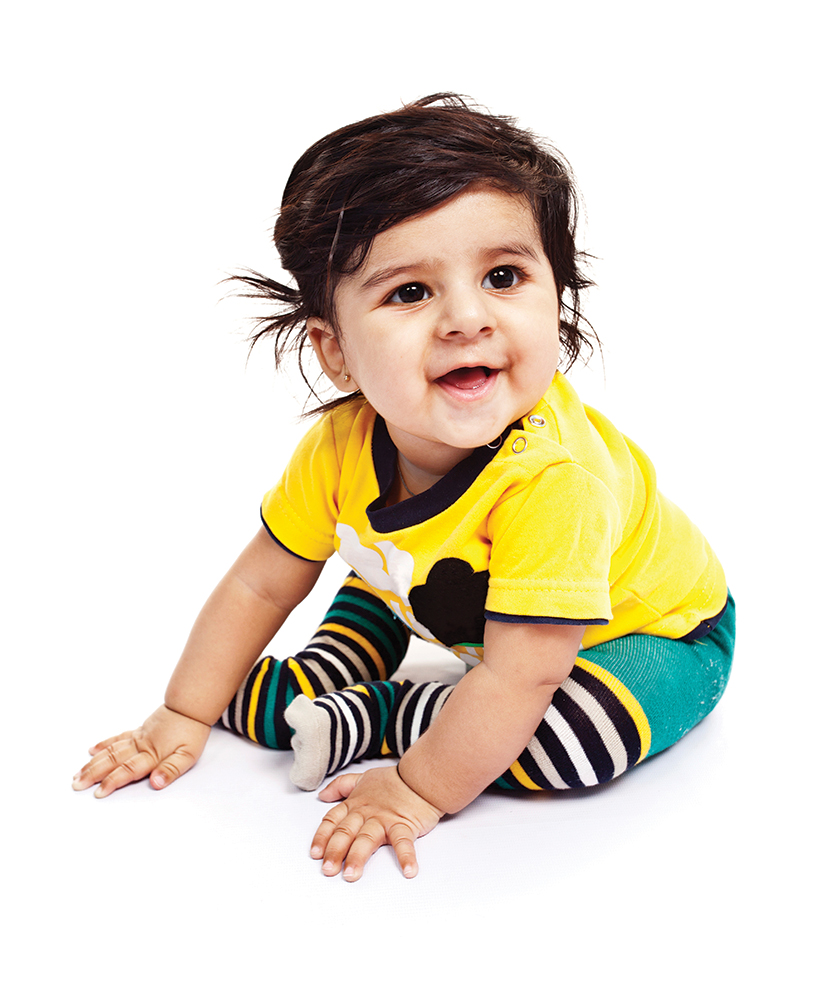
All about your 6-month-old baby!
Physical development: Many babies can sit up and roll over. She’ll roll over often if she’s already rolling by 6 months, says Seattle Children’s pediatrician Dr. Mollie Greves Grow. Your baby is ready for and needs to be introduced to solid foods, according to the American Academy of Pediatrics. Breast milk is still hugely beneficial. Consult your doctor for how to introduce solids. Begin simply, with one appropriate food at a time.
Brain development: Baby is able to focus more on objects. She begins to move objects around with her hands and continues to be very interested in faces, words and interactions, says Grow. Soon your baby may start transferring objects from one hand to the other, according to the Mayo Clinic. Your baby’s vision will also be clearer. You might notice your baby concentrating on one object or toy, or following a moving object like a ball as it rolls around the room. Position a safe mirror securely on the wall near the ground and let your baby enjoy studying her own reflection.
Social development: She’s very interactive, with more vocalizations, says Grow. By 6 months of age, your baby might recognize her name, according to the Mayo Clinic.
Fun fact or milestone: She’s very interested in food, says Grow. Music can help soothe, entertain and teach. Try playing classical music, lullabies and simple toy instruments with your baby.
What to watch for/common concerns: Everything goes in her mouth. Be aware of choking hazards; your baby can reach more items now that she can sit up, says Grow.
One important thing you can do for your baby: Read to her more often, says Grow. Talk, talk and talk some more, recommends the Mayo Clinic. Your tone of voice can communicate ideas and emotions. Ask your baby questions; describe what you see, hear and smell around you; count toys; sing songs.
Months 7 through 12
Read what's next in "Baby's First Year: A Guide to Development Month by Month".











